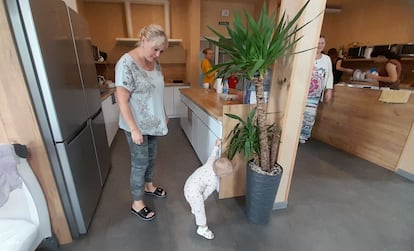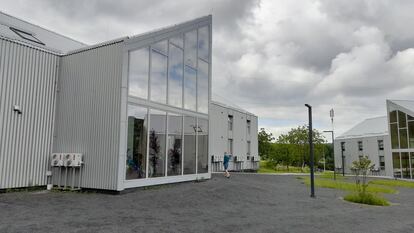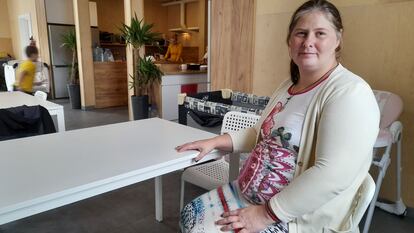The shelter in Ukraine that’s just for mothers
The city of Lviv has launched an innovative idea to welcome pregnant women or women with young children fleeing the east of the country. The objective is to keep them away from violence in their first months of motherhood


The effects of a war are always there, lurking in the background. For Olga Parobeiko, 42, a midwife, they appear as she talks about her work at the “Unbreakable Mothers” Center, a shelter in the eastern Ukrainian city of Lviv, which provides assistance to refugee mothers. She is the expert and knows how everything works there. But while describing her job, she starts to cry. Her daughter has lost her husband in the war, and the memory brings a lump to her throat. Near or far from the front, the violence casts a long shadow. Parobeiko pulls herself together and explains that this shelter has welcomed some 60 mothers since it opened a year ago, most of them from Donetsk and Luhansk, eastern provinces targeted by Russia. At present, 12 women and 27 minors plus two elderly people live there. The center has one rule above all others: no men allowed.
The original idea came from local Lviv authorities and was put into operation with the help of the Ukrainian Red Cross. It is part of the municipal government’s goal to build an “ecosystem” of services for those fleeing the fighting in the east of the country. These services include hospitals, rehabilitation and prosthesis centers, schools, nurseries... and this shelter for pregnant women and mothers with small children. All these services are connected to each other via public transportation. Since February 2022, around six million people have passed through Lviv, fleeing the Russian invasion. It is estimated that around 150,000 of these displaced persons have remained in the city.
Tanya Kondakova, 39, is one of the many who have decided to remain in Lviv, at least for a while. Her story offers very little hope. She has three children: the oldest are 16 and 10, and the youngest is just seven months old. “He was born with the new year,” says Tanya, who is originally from Bakhmut, a city devastated by the war. With Russian bombs raining down, Tanya decided to flee with her children and mother. They lived first in a student residence in Lviv, but with just one room, there was not enough space for everyone. The children’s father is currently in Germany. “From time to time he calls, but rarely,” says Kondakova, who doesn’t want to go into any more detail.
Officially, the “Unbreakable Mothers” Center does not allow the women to stay there indefinitely. The rules are clear: the stay can be extended until the child has reached one year of age. But exceptions are made if the circumstances require it. The mothers who spoke to EL PAÍS neither had a set day to pack up and leave, nor knew when would be leaving. That’s the case for Kondakova. “I need a place that is conditioned for my children [like her, they have a degree of disability],” she says. “And this is free.” She thought about traveling to Poland or Sweden, where she has a sister, but she decided she wanted to stay in her country.

The mothers and pregnant women who arrive in Lviv also have another option. They can choose to stay with their partners, who are put up in housing modules. But this is exactly what the project wants to avoid. These prefabricated modules, which are necessary in an emergency, are separated, meaning that if the residents want to go to the bathroom, to cook, to do laundry or take children to play, they need to go outside ― everything is in a different room. And with winter temperatures falling below zero, that is not a great idea.
Two mirror houses, a forest and a lake
The “Unbreakable Mothers” Center wanted to provide more than basic care; it wanted to create a supportive environment, in which these displaced women could focus on their pregnancy, giving birth and caring for their newborns.
The center is located in the middle of a dense forest about three miles from the center of the city. The project was designed by local firm Sulyk Architects, and completed in just three months. The center consists of two mirror houses, each with 13 rooms, and can accommodate a total of 112 people.
The large windows offer natural light to all floors of the house. Downstairs, there are the bedrooms, the kitchen and the communal dining room. Upstairs, there is an open room full of toys and a large screen for cartoons. Children go up and down; in and out, running between the park to the lake that gives way to a leafy grove.
It’s time to eat and Olga Kravchenko, 33, a native of Kharkiv, is preparing food. She has a half-smile and twinkle in her eyes that suggests she’s up to something, but that’s not the case. Kravchenko worked in a milk factory in her hometown, but the building in which she lived was hit by Russian missiles. Even the kitchen of her home was damaged. Eleven months ago, she decided, with her husband and two children (13 and 10 years old), to flee the town. Along the way, she gave birth to another child, who is now eight months old. “For now we are going to stay here,” says Kravchenko, “We cannot pay rent [around 12,000 grivnas, around $330 a month].” Her husband works in construction in another city and spends the nights there, in a module.

Olga Shevchenko, 33, bursts out laughing when asked about how many children she has. She has four, aged one, eight, 10 and 12. “I am a single mother,” adds Shevchenko, who left her home in Lysychansk, in Luhansk province, in March 2022. She does not plan to return; the territory is controlled by Russian troops. Soon she will receive a diploma to work as a hairdresser, but with four children, she says with a smile, working will not be easy.
When asked what she likes about the center, she replies: “It’s a residence where I can live a normal life.” But she admits that her children would prefer for them to live in an apartment.
According to Parobeiko, the center’s psychosocial care services meet with the women twice a week, and also help them in their search for a future outside the center. But the current situation in Ukraine does not help matters. “Here they have a private space,” explains Parobeiko, “without stress, in a circle of mutual support in which they understand each other very well.”
Sign up for our weekly newsletter to get more English-language news coverage from EL PAÍS USA Edition
Tu suscripción se está usando en otro dispositivo
¿Quieres añadir otro usuario a tu suscripción?
Si continúas leyendo en este dispositivo, no se podrá leer en el otro.
FlechaTu suscripción se está usando en otro dispositivo y solo puedes acceder a EL PAÍS desde un dispositivo a la vez.
Si quieres compartir tu cuenta, cambia tu suscripción a la modalidad Premium, así podrás añadir otro usuario. Cada uno accederá con su propia cuenta de email, lo que os permitirá personalizar vuestra experiencia en EL PAÍS.
¿Tienes una suscripción de empresa? Accede aquí para contratar más cuentas.
En el caso de no saber quién está usando tu cuenta, te recomendamos cambiar tu contraseña aquí.
Si decides continuar compartiendo tu cuenta, este mensaje se mostrará en tu dispositivo y en el de la otra persona que está usando tu cuenta de forma indefinida, afectando a tu experiencia de lectura. Puedes consultar aquí los términos y condiciones de la suscripción digital.








































